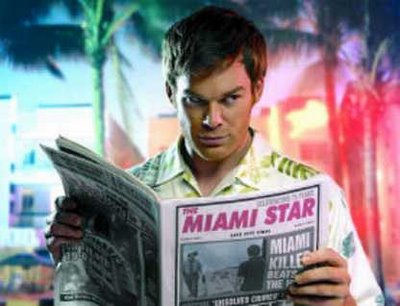Monday, October 02, 2006
Miami Lice
I'm not a fan of any of the epidemic forensic murder investigation shows, or our recent spate of torture-driven horror movies, so it's probably not too surprising that I didn't care much for Showtime's debut episode of DEXTER.
What intrigues me about the show are its sociologic implications. It posits a serial killer, a Miami PD forensics expert played by Michael C. Hall, in the heroic position while the police are depicted as either inept or corrupt. The first episode rationalizes Dexter's murderous impulses by giving him the equivalent of a superhero origin story, complete with roseate flashbacks to his boyhood, when his understanding cop father urged him to use his "talent" for killing stray animals for good, reminding him that most murder cases go unsolved -- hence, unpunished. Our "hero"'s initial adversary is a super-artistic killer whose acts of destruction are made to look downright creative. ("This guy is good," Dexter wows to himself, further confusing audience concepts of what is right and wrong.) And since Dexter is asexual and keeping company with a traumatized rape victim (Julie Benz), the concept of friendly, humanizing copulation is as mutually unacceptable to them as it would be to members of the Moral Majority. Besides, healthy sex and intimacy would only serve to distract viewers from the emotionally remote ways in which the show details the art of lowering one's carnage visor and inflicting a painfully slow and conscious death.
I wasn't so offended by anything in DEXTER that I wanted to turn it off, but given its implications rather than its gore, I found it kind of sick. I also fear its potential to inspire the wrong sort of people, not to mention subliminally reinforcing of our government's current pro-torture stance. I think, over time, worst case scenario, it could help people to become more accepting of the idea of inflicting pain and defying our laws for the "correct moral reasons," and make them more accepting of the idea that the monster can also be the hero. Perhaps the show is deliberately tapping into this zeitgeist, to present people with the horror of what we have become as a nation, but that doesn't make it easier to swallow, or any the less defiling.
I thought Michael C. Hall was fantastic on SIX FEET UNDER but, performance-wise, I have to wonder what he thought he was doing here with his eyes; he often has a deer-in-the-headlights-on-poppers expression, so extreme I worried that he might burst out of his own face if he stared and grinned at his co-stars with heartier enthusiasm. His voice-over narration, à la AMERICAN PSYCHO, is a bad idea that works against one's involvement with his performance while telegraphing its every turning point; is this show so subtle that it needs idiot cards, or is that the audience it hopes to attract? One hopes this supremely unsubtle technique will be discarded, like those funeral home accessory commercials that flanked the first episodes of SIX FEET UNDER.
I'll probably watch at least the next episode or so of DEXTER out of Sunday night inertia, but I was disappointed by this nasty, flower-shirted parade of anomie -- and especially so when I found out, later in the evening, the apparently stale news that Showtime has not renewed HUFF for a third season. Poor ratings aside, HUFF was an extremely well-acted, well-written, and challenging show that managed to be thoughtful, sensitive, and riotously transgressive at the same time.
After the debut, Showtime ran a series of promos for DEXTER accompanied by some of the most enthusiastic press blurbs I've seen in ages. I don't get it, but all this playing-up is another reason to be wary of the media. Yet there's too much talent invested in this show for me to give up after a single episode; I'm kind of curious to see where DEXTER thinks it's going, and a bit worried about it, too.
